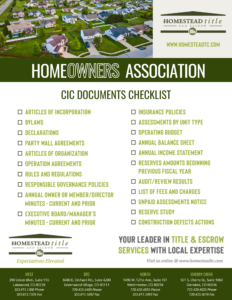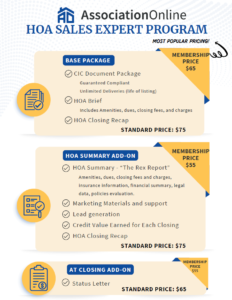When buying/selling a property where there is a Homeowner’s Association, the buyer and sellers may be required to pay certain fees set forth on the real estate contract. Some of these fees are paid only by the seller and some are negotiated to be paid by either buyer, seller or split.
While title companies close and insure the transaction, HOA fees are not title company fees. These fees are set forth by the HOA, the management company or a third party document retrieval company.
The typical fees that appear on a settlement statement are:
» CIC Document Retrieval Fees (Seller Fee)
» Status Letter Fees (Seller Paid)
» Transfer Fees (Buyer or Seller Paid)
» Working Capital (Buyer or Seller Paid)
» Private Transfer Fee (Buyer or Seller Paid)
Rush fees are assessed by the HOA or management company if not enough adequate time has been allotted to provide the required documents on the contract. If the transaction cancels, the title company is not obligated to pay any of the outstanding procurement fees for CIC (Common Interest Community) documents or the status letter. Those retrieval costs are due from the seller.
FEES
—
» CIC Docs: $70
» Status Letter: $65
» Extra Product (not needed by title): HOA Info Report: $50
Title Minutes
CIC Documents
When a property goes under contract, title teams immediately review the deadlines, including the CIC document deadline. Since HOAs process requests only on weekdays, it’s best to allow at least 10 business days to avoid rush fees, which are charged by the HOA, not the title company. The seller is contractually obligated to provide these documents, which include CC&Rs, bylaws, budgets, and insurance policies. Buyers are bound by these rules once the title transfers. The title commitment will also disclose the CC&Rs under exceptions that affect title insurance coverage. Reviewing these documents ensures that buyers understand their responsibilities.
Avoid HOA Rush Fees
To avoid rush fees, allow 10–14 business days for HOA/CIC documents in the contract. Since HOAs don’t process requests on weekends, only weekdays count toward the deadline. Sellers are responsible for ordering and paying for the documents, even if the deal cancels. Title companies don’t profit from HOA fees, as they use procurement companies that prepay for the documents. If there’s not enough time to retrieve the documents, rush fees apply, and sellers must cover those costs. Educating sellers early about this process ensures a smoother and more affordable closing.
CC&R’s
CC&Rs are legal documents that govern the rules and regulations of a community, such as a homeowners association (HOA). They outline shared and limited common elements, like pools or parking, and specify the rules homeowners must follow. Restrictions can cover everything from pets and noise to parking and property design. Some CC&Rs may include deed restrictions based on age or income, though discriminatory clauses are no longer enforceable. Buyers should review these documents carefully before closing to avoid violations or fines. CC&Rs help preserve property values and ensure the community maintains a consistent standard.






